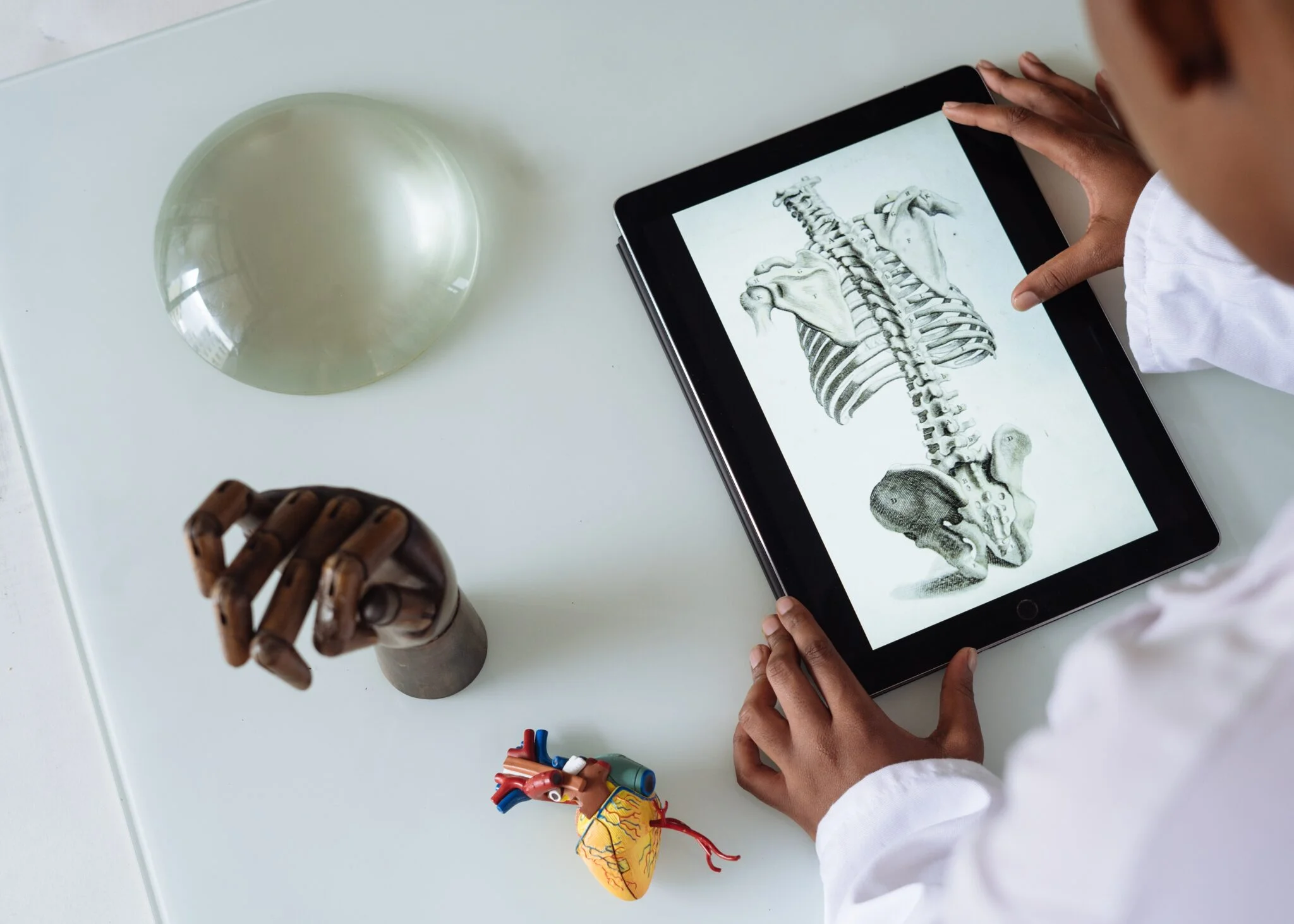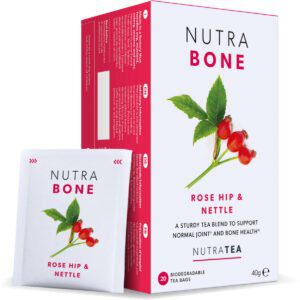SLEEP & RELAXATION IMMUNITY & ANTIOXIDANT VITALITY & INFLAMMATION ANTIOXIDANT & DIGESTION ENERGY & CLARITY WELLNESS & BLOOD SUGAR RESPIRATORY & IMMUNITY PREMIUM & FLAGSHIP BLENDS FLAGSHIP TEAS PREMIUM BLENDS PREMIUM & FLAGSHIP BLENDS PREMIUM & FLAGSHIP BLENDS PREMIUM BLENDS TEA MUGS, CADDY & BUDDY
7 Top Tips for Healthy Bones

Keeping our bones strong and healthy is one of the keys to staying active and mobile as we age. Discover our 7 top tips for healthy bones (that go beyond just drinking more milk).
—
When we’re young, most of us don’t give much thought to our bones unless we’re unlucky enough to break or injure one. But that quickly changes once we reach 30 and realise that we’ve already passed the age when our bones will have their peak mass.
After around the age of 30, we start to slowly lose bone density. If you menstruate, this effect tends to speed up after menopause. Oestrogen helps to protect against bone loss, but this protective effect disappears once your hormone levels drop.
This can lead to weak, fragile bones that are more prone to breaks and fractures. In some cases, it can even develop into osteoporosis.
Both men and women over the age of 50 are at a higher risk of developing weak bones. But there are some simple lifestyle changes you can make that mean you’re more likely to keep your bones healthy and strong for longer.
These 7 tips for healthy bones are all small changes you can easily make to your lifestyle. Like any healthy habit, they require regular practice to make a difference. But when you make an effort to incorporate these tips into your daily life, you should soon feel the difference in your overall wellness.
Your bones will thank you for it too.
1. Get Plenty of Vitamin D
Vitamin D spends plenty of time in the headlines, and with good reason. Many of us are deficient in this vital nutrient, which plays an essential role in our health, including keeping our bones strong and healthy.
Uniquely, our bodies can make vitamin D when our skin is exposed to sunlight, so spending plenty of time outdoors will benefit your bone health. However, that isn’t always practical for those of us who live in colder, wetter climates (like the UK). As a result, many of us will want to take a vitamin D supplement, at least during the winter months.
The NHS recommends that everyone in the UK should take a daily supplement of 10 micrograms of vitamin D between October and late March.
2. Move Your Body
Getting moving can do wonders for your mental and physical health. And that includes keeping your bones stronger for longer.
When you exercise, you encourage your bones to meet the demands placed on them by becoming denser. This can help to maintain healthy bones into old age.
For the best effects, look to do a variety of both weight-bearing and resistance exercises throughout the week. Weight-bearing exercises are those where you’re on your feet – jogging, brisk walking, skipping, dancing, jumping, and ball sports are all good options.
Resistance exercises are the strength-training exercises that build both our muscles and our bones. You could lift weights in a gym or use bodyweight exercises like push-ups and pull-ups.
The key is to find forms of exercise you enjoy that fit within your schedule and won’t aggravate any old injuries or joint issues. You could always work with a personal trainer to help you develop a routine that works for you, or there are plenty of resources available online.
3. Eat Lots of Fruits & Vegetables
A diet that is packed with fruits and vegetables is brilliant for keeping our bones healthy. These plant-based foods are full of essential nutrients, including vitamin C, which stimulates the formation of new bone cells.
Eating plenty of vegetables is also linked to high bone mineralization – in other words, it encourages good bone density and protects against bone loss.
People who eat lots of yellow and green vegetables seem to experience less bone loss than those who don’t, including after menopause.
4. Incorporate Calcium-Rich Foods into Your Diet
Another reason to eat your greens is that many vegetables are an excellent source of calcium, which is the major component of our bones. We need to eat calcium-rich foods to keep our bones strong.
You probably already know that dairy foods, like milk, cheese, and yoghurt, are great ways to get more calcium into your diet. But if you are vegan or lactose-intolerant, don’t worry, there are plenty of other sources of calcium too.
These include leafy green vegetables such as broccoli and cabbage, tofu, nuts, and bread made with fortified flour. Just a heads up though – spinach may be high in calcium, but it also contains oxalate. This compound can reduce calcium absorption, so spinach isn’t the best choice for those looking to up their calcium intake.
You could also opt to take a calcium supplement. If you do, look for one that combines calcium and vitamin D – the vitamin D helps with calcium absorption.
Phosphorous is also an important component of our bones. However, phosphorous deficiency is relatively uncommon. It is found in many foods, including meat, dairy, pulses, and nuts. Too much phosphorous can be as bad as too little, so speak to a doctor before making changes to your diet if you think you might be deficient.
5. Get Enough Protein
Not getting enough protein can make our bodies less efficient at absorbing calcium, so we want to make sure our diets contain adequate levels.
This is especially the case after menopause. Research indicates that women who get more protein in their diets are less at risk of fractures and have higher bone density than those who don’t eat enough.
As always, the key is finding a healthy balance. High protein diets have become something of a fad lately, but most of us don’t need to go overboard with our protein intake.
The British Nutrition Foundation recommends aiming for 0.75g of protein for every kilogram of body weight. For most of us, that should be achievable from our diets, with no need to take protein supplements.
6. Watch Your Magnesium and Zinc Intake
Calcium and phosphorous are two vital minerals for healthy bones, but magnesium and zinc have a role to play too.
Magnesium supports calcium absorption by helping to convert vitamin D into its active form. In the meantime, zinc stimulates bone formation and protects against bone loss. It is also one of the building blocks of our bones themselves, although in very small amounts.
Zinc is found mainly in meat, legumes, nuts, and whole grains. Magnesium is in chocolate (hurray), dark leafy green vegetables, nuts, legumes, seeds, whole grains, and dairy products.
7. Enjoy Bone-Strengthening Herbal Teas
As you’ve probably gathered by now, one of the best ways to keep your bones strong and healthy is to eat a well-balanced diet with plenty of mineral-rich foods. And incorporating herbal teas into that healthy diet can help you access a wider range of nutrients.
Many herbs are excellent sources of minerals and also contain vitamins and plant polyphenols to protect our bone health. For example, nettle tea is high in calcium, while green tea contains antioxidants that protect against bone loss and damage.
You’ll find both nettle and green tea in NutraBone, our herbal tea blend designed to support your bones and joints.

